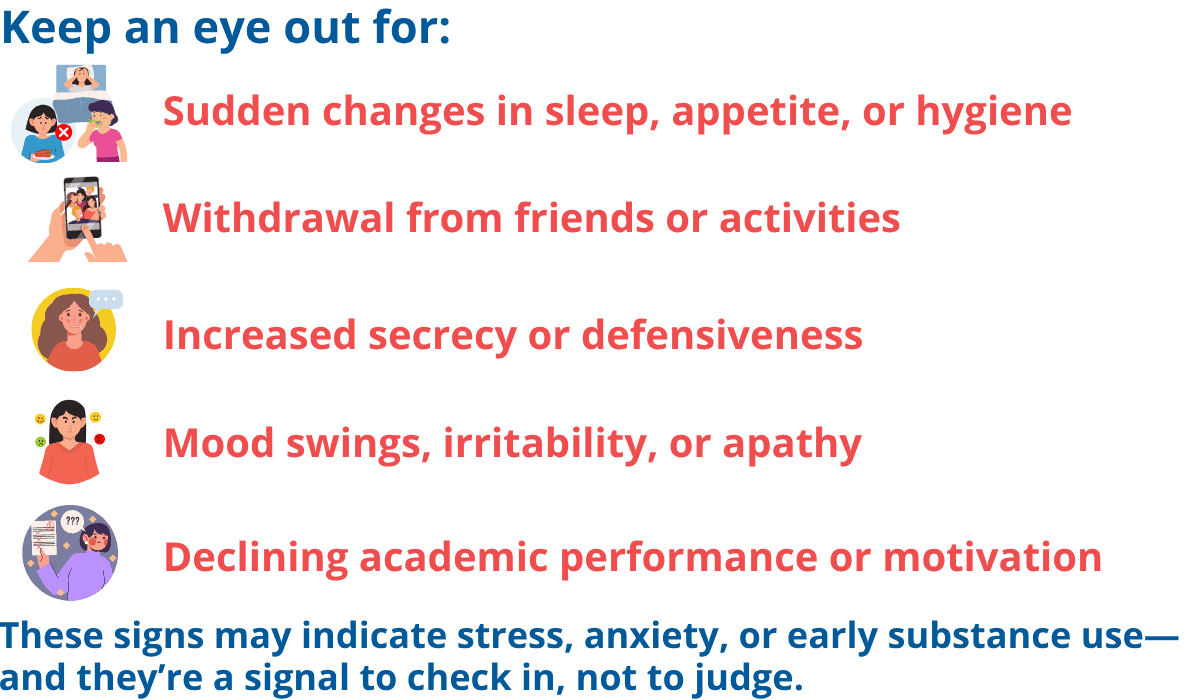BACK TO SCHOOL:
What Parents and Educators Should Know About Substance Use and Mental Health
This month, we are featuring a guest Blog by Emily Parsons, MA – Assistant Director of Health Promotion at the University of Tampa.
Some students are anticipating what is coming this school year and are full of excitement. For others, back to school can mean academic stress, social pressure, and exposure to environments where alcohol and other drugs are present. As parents and educators, we can be proactive for our students by learning what students might encounter, identifying warning signs of problematic use, and having conversations early.
What Students May Encounter
As students start the school year, there can be a pressure to fit in socially and excel academically, and they might see alcohol and drugs as the way to do it. They may see others vaping and decide to try it too, they may attend parties where alcohol is the norm or only feel comfortable socializing while under the influence. Some students may use substances to cope with anxiety or academic stress. While the intention might be well-meaning in the pursuit of success and friends, they may be unaware of the risks associated with high-THC products like paranoia or hallucinations, fake IDs which are a felony in Florida, or spiked drinks.
We can help by keeping an eye on our students to recognize any difficulties they are experiencing while at school, some examples are below.

Mental Health & Substance Use: Warning Signs
A change in schedules and routines can throw anyone off their game so it may take a little time for students to adjust. However, if you notice that after a while they are not adjusting or they suddenly change their behaviors, it’s time to have a conversation.

Tips for Parents: Be the Influence
You are one of the most powerful protective factors in your child’s life. Here’s how to make that influence count and some example phrases you can use:

“School is starting soon and I am really excited for you. I know that it can be stressful with a new workload and wanting to have a fun year too. I’d like to have some honest conversations with you as we approach the school year. It isn’t to get you in trouble or to judge you. I want to understand you and to let you know we can talk about anything you are going through.”

“What are some safety tips related to alcohol and other drugs you already know about?”
“What would you do if you saw someone passed-out at a party or a bar?”
“What are some questions you can ask or things you can say if someone offers you something to take?”
“What if you notice people (vaping, drinking, smoking, etc.) around you – would you think about joining in?
“What are some options to make sure you get home safe?”
“What questions have you always wondered that I could maybe answer?”

“I appreciate you talking so openly with me. There are some expectations I do have for you as your parent that I want you to be aware of. This doesn’t mean you shouldn’t come to me if you broke an expectation and you really need me. It just means I want you to know what is important for me to tell you for your safety,”
Example Expectations: No fake IDs. No driving under the influence. Start slow with any substance—if at all.

Check in during high-risk times (e.g., Gasparilla, Spring Break)
“Hey, I know Spring Break is coming up. What are your plans?”
“Do you participate in 4/20? Where are you planning to get the stuff from?”
Ask open-ended questions about academics, friendships, and free time to get longer responses
instead of the “Good” “Yes” or “No”
“What are your classes like this semester? What are the easy/hard ones and why?”
“What’s new with the friend you told me about last time?”
“What are you doing outside of class?”
Connect Them to Resources
If you notice changes in behavior, guide them toward campus or community support:
“I’ve noticed you haven’t been going to your soccer practice and games lately. You also haven’t hung out with your friends this month. I am worried you might be depressed and I think it will be helpful to talk to someone. I heard wellness coaching or counseling can be helpful for people. Which one would you be interested in?”
In Summary
Back-to-school is more than just new classes—it’s a fresh opportunity to build resilience, foster connection, and protect our student from the hidden risks they may face. Whether you’re a parent or educator, your role matters. We know that you will create environments where students feel safe, supported, and empowered to thrive.
